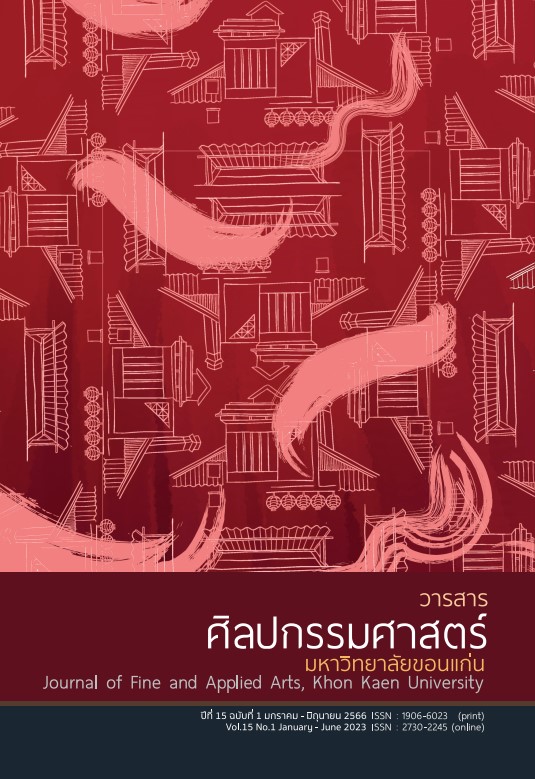Public Opinion into a New Music Curriculum: a Case Study of Lower-Northern Thailand
Main Article Content
Abstract
The thriving of music curriculum development in higher education is contingent upon the shrewdness of curriculum committee. They are responsible for a music curriculum to thrive concurrently with global mainstream by which one of key indicators of success is to meet stakeholders’ expectations. This article aimed at garnering and analyzing public opinion in order to shape a new music curriculum. After distributing and collecting a thoroughly created online questionaire to elicit public opinion from high school students, current music students, music alumni, acclaimed music educators, employers, and others, I used Pivot Table to conduct data analysis that the process resulted in a form of statistics. Then, the data were later translated into descriptions. The results show that there are agreements and arguments on particular subjects amongst those respondents: collective opinions versus branched opinions, as well as some public opinions that do not concur with academics’ propositions.
Article Details

This work is licensed under a Creative Commons Attribution-NonCommercial-NoDerivatives 4.0 International License.
Content and information in articles published in the Journal of Fine and Applied Arts of Khon Kaen University is regarded as the opinion and sole responsibility of the author(s) directly; therefore, editors are not obliged to agree to or share any responsibility with regard to the content and information that appears within these articles.
All articles, information, content, image, etc. that have been published in the Journal of Fine and Applied Arts of Khon Kaen University is the copyright of the Journal of Fine and Appllied Arts of Khon Kaen University. Any person or organization who wishes to distribute all or parts of the articles for further dissemination or other usage must first receive permission from the Journal of Fine and Applied Arts of Khon Kaen University before proceeding to do so.
References
คณิเทพ ปิตุภูมินาค. (2563). สภาพการจัดการศึกษาดนตรีระดับอุดมศึกษาในภาคเหนือของประเทศไทย. วารสารศึกษาศาสตร์สาร มหาวิทยาลัยเชียงใหม่, 4(3), 106-119.
เดโช แขน้ำแก้ว และคณะ. (2563). บัณฑิตพัฒนาชุมชน: วิเคราะห์ผลสำรวจและแนวทางพัฒนาคุณลักษณะ ตามอัตลักษณ์ของบัณฑิตที่สำเร็จการศึกษาจากมหาวิทยาลัยแห่งหนึ่งในภาคใต้. วารสารวิชาการเครือข่ายบัณฑิตศึกษา มหาวิทยาลัยราชภัฏภาคเหนือ, 10(1), 17-32.
วิชนาถ ทิวะสิงห์, และศิรินภา วงษ์ชารี. (2563). โครงการสำรวจความต้องการผู้ใช้บัณฑิตต่อคุณลักษณะบัณฑิตที่พึงประสงค์ของตลาดงานทางด้านสถาปัตยกรรมและการออกแบบในสถานะการณ์ปัจจุบัน. วารสารสถาปัตยกรรม การออกแบบและการก่อสร้าง, 2(3), 13-32.
เสาวนีย์ ศรีจันทรนิล. (2556). ความพึงพอใจของนายจ้างที่มีต่อบัณฑิตสาขาวิชาการตลาด วิทยาลัยราชพฤกษ์ ที่สำเร็จการศึกษาระดับปริญญาตรี ปีการศึกษา 2554. วารสารบัณฑิตศึกษา มหาวิทยาลัยราชภัฏ วไลยอลงกรณ์ ในพระบรมราชูปถัมภ์, 7(3), 174-184.
Ball, H. L. (2019). About research: Conducting online surveys. Journal of Human Lactation, 35(3), 413-417.
Boyle, B., & Charles, M. (2016). Curriculum development: A guide for educators. Los Angeles : Sage Publications.
Glatthorn, A. A., Boschee, F. A., Bruce M. Whitehead, B. M., & Boschee, B. F. (2016). Curriculum leadership: Strategies for development and implementation. 4th ed. Los Angeles : Sage Publications.
Gneezy, U., Meier, S., & Rey-Biel, P. (2011). When and why incentives (don't) work to modify behavior. The Journal of Economic Perspectives, 25(4), 191-209.
Joseph, P. B. (2011). Cultures of curriculum. 2nd ed. Mahwah, NJ : Routledge.
Oliva, P. F. (2005). Developing the curriculum. 6th ed. Boston : Pearson Allyn and Bacon.
Parkay, F. W., & Hass, G. (2000). Curriculum planning: A contemporary approach. 7th ed. Boston : Allyn and Bacon.
Picciano, A. G. (2017). Online education policy and practice: The past, present, and future of the digital university. Mahwah, NJ : Routledge.
Richards, J. C. (2002). Curriculum development in language teaching. 2nd ed. Cambridge : Cambridge University Press.


